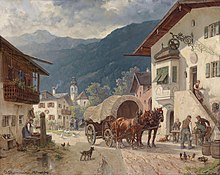Désiré Thomassin
Désiré Thomassin (born February 11, 1858 in Vienna , † March 24, 1933 in Munich ) was an Austrian painter and composer .
Life
Désiré Thomassin was the son of a high administrative officer of the Duke of Parma and a German. At the age of 19 Thomassin became a student at the Royal Music School in Munich in 1877. Until 1881 he was a student of Professors Josef Gabriel Rheinberger and Max Hieber .
After completing his studies, Thomassin worked as a music teacher in various positions until 1883. Thomassin saw himself primarily as a composer. Despite some recognition in this area, he could not support his family with it. So he switched to painting. It is generally stated that Thomassin studied with Wilhelm von Diez at the Royal Academy of Arts in Munich. However, it cannot be proven in the Academy's register lists; studying at the academy can therefore be excluded.
Despite his talent for painting, he hardly received any commissions and was unable to improve his precarious economic situation. Therefore, he began to work for the Munich art dealer Jakob Anger. He regularly took pictures from him for only a small fee. Thomassin suffered from this "compulsory labor" and signed many pictures with the assumed name Renardt. In the summer months when there were many tourists, Anger often held auctions, at which Thomassin had to mingle with the buyers and drive up prices through sham bids.
The focus of Thomassin's work was rural genre scenes and coastal landscapes in finely graded mood painting. In doing so, he leaned heavily on Diez's naturalistic style. Thomassin was close to the Dachau artist colony and was a member of the Reich Association of German Artists .
As a composer Désiré Thomassin only became known to a wider public from around 1908. Felix Mottl is commonly cited as an essential pioneer of this late and sudden discovery by Thomassin . From 1908 Thomassin's works were played a lot in German-speaking countries and received good reviews. Désiré Thomassin dedicated his violin concerto to the famous violinist Felix Berber , who also premiered it. The psychologist Franz Carl Müller-Lyer even mentioned Thomassin in his book "Phases of Love" (1913) in the same breath as Ludwig van Beethoven and Bruckner . Most of Thomassin's early works (before 1908) were withdrawn by the composer. Rather, a major compositional creative phase began from 1908, in which most of the works by Désiré Thomassin known today were created.
Compositions
- 2 symphonies
- Sinfonietta for chamber orchestra
- Violin concerto
- The power of song for solos, choir and orchestra
- 3 violin sonatas
- Cello sonata
- Piano trio
- 3 string quartets
There are sometimes differences in the number of genres of work, depending on whether or not Thomassin's early works are included.
Web links
- Biography on www.tobias-broeker.de
- Sheet music and audio files by Désiré Thomassin in the International Music Score Library Project
Individual evidence
- ↑ Riemann, Hugo: Musiklexikon. 11th edition, 1929. Berlin: Max Hesses Verlag. Page 1840
- ↑ https://www.tobias-broeker.de/rare-manuscripts/sz/thomassin-desire/
| personal data | |
|---|---|
| SURNAME | Thomassin, Désiré |
| BRIEF DESCRIPTION | Austrian painter and composer |
| DATE OF BIRTH | February 11, 1858 |
| PLACE OF BIRTH | Vienna |
| DATE OF DEATH | March 24, 1933 |
| Place of death | Munich |

